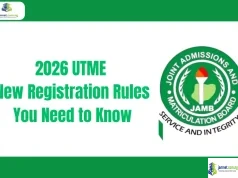A guide to the GRE test for international students, covering what the GRE is, why it matters, which countries require it, and how to prepare.


If you have just completed your undergraduate studies and are considering pursuing a master’s degree abroad, you may be wondering if you need to take the Graduate Record Examination (GRE).

Join our Telegram Channel for Instant Scholarship Updates
While many students become unsure whether to register for this exam or to focus on other parts of their application, the reality is that not every university or program requires the GRE. However, even when it is optional, achieving a good score can distinguish you, strengthen your application, and significantly improve your chances of gaining admission.
This guide will clarify whether you need the GRE to study abroad, explain its importance, indicate which countries commonly require it, and offer effective preparation methods. By the end, you will know exactly how to approach this critical step in your academic journey. For more guidance on this decision, please review these top 10 questions to help you decide if studying abroad is right for you.
What is the GRE Test?
The Graduate Record Examination (GRE) is a standardized test used by universities to assess applicants for master’s degree, MBA, and PhD programs. For many decades, it has been an essential part of the admissions process, particularly in the United States and Canada. The examination evaluates three main areas: verbal reasoning (reading comprehension and vocabulary), quantitative reasoning (mathematics and problem-solving), and analytical writing (the ability to create clear, logical arguments). In simple terms, it measures your readiness for the academic demands of graduate-level study.
Consider the GRE as your academic passport. While your academic transcripts, letters of recommendation, and statement of purpose are all vital, the GRE provides an additional advantage, especially when you are competing with a global pool of students. Universities use GRE scores to compare applicants from diverse academic backgrounds in a fair manner, offering a standardized measurement of your skills.
The GRE is especially valuable for highly competitive programs like computer science, engineering, and social sciences, where many candidates already possess strong academic records. A high score can truly be the factor that tips the scales in your favor.
The test is administered either online (computer-based) or on paper, depending on your location. You are permitted to take it up to five times within a 12-month period, with a 21-day interval between each test. The scores remain valid for five years, providing you with ample time to use them for your applications.
The test fee is approximately $205 globally, although fees may be slightly higher in certain countries. The duration is about 3 hours and 45 minutes, with three distinct sections: Analytical Writing, Verbal Reasoning, and Quantitative Reasoning.
A Closer Look at the Test Sections
- Verbal Reasoning: This section does not simply test your vocabulary; it evaluates your capacity to comprehend intricate concepts. You will encounter question types such as Text Completion, where you fill in missing words in a passage; Sentence Equivalence, where you select two words that produce the same meaning in a sentence; and Reading Comprehension, where you analyze passages on various subjects. The key here is not just knowing words, but understanding how they function within a specific context.
- Quantitative Reasoning: Often called the “math section,” this portion of the test evaluates your ability to solve problems using fundamental mathematical concepts. You will encounter questions involving algebra, geometry, and data analysis. The questions are more focused on logical reasoning and strategy than on complex calculations. The test provides an on-screen calculator, so your primary focus should be on problem-solving, not mental arithmetic.
- Analytical Writing (AWA): This section consists of two essays: “Analyze an Issue” and “Analyze an Argument.” For the “Issue” task, you will present your perspective on a given topic, supported by reasons and examples. For the “Argument” task, you will critique someone else’s argument, identifying logical flaws and weaknesses. These essays do not require specialized knowledge; they evaluate your ability to think critically and express your ideas clearly and convincingly.
Is the GRE Compulsory to Study Abroad?
The truth is, not all universities require the GRE. Some institutions waive it entirely, while others make it optional. For example, many universities in the U.S. and Canada expect it, whereas some schools in the U.K. and Germany only recommend it. Even if it is not a requirement, taking the GRE can still give you a significant advantage. It can help your application stand out, demonstrate your academic preparedness, and even increase your chances of securing scholarships or research assistantships. Before attempting the test, you must verify the specific requirements of the programs to which you are applying.
The GRE is most common in the U.S. and Canada, where many graduate schools require it. Prestigious universities such as Harvard University, Yale University, and McGill University frequently expect strong scores. In the U.K., schools like the London School of Economics or University College London may request it, especially if your undergraduate degree was not from a U.K. university. In Germany, the GRE is not mandatory, but a strong score can enhance your application at universities like Heidelberg University. If you are considering other options, you can also explore this guide on the top 10 universities in Australia for international students.
When to Take the GRE (Even If It Is Optional)
While the test-optional movement has gained popularity, a strong GRE score is still a powerful tool. You should consider taking the GRE even if it is not required in the following scenarios:
- To Compensate for a Lower GPA: If your undergraduate grade point average is not as high as you would prefer, a strong GRE score can demonstrate your academic potential and show admissions committees that you are ready for graduate-level work.
- To Stand Out in a Competitive Applicant Pool: In highly competitive fields like computer science or engineering, every detail is important. A high GRE score can be the distinguishing factor that places you ahead of other equally qualified candidates.
- For Scholarship and Assistantship Opportunities: Many universities use GRE scores as a criterion for awarding merit-based scholarships and research or teaching assistantships. A good score can make a considerable difference in your financial aid package.
- To Show a Strong Foundational Skillset: If your undergraduate degree is from a less-recognized university or is in a different field from your desired master’s program, the GRE provides a standardized way to prove your aptitude for graduate studies.
How to Prepare for the GRE
You may be wondering how long you need to prepare for your GRE test. Typically, a preparation period of one to three months, which amounts to approximately 100–120 hours in total, is most effective. The exact time needed depends on your target scores and your familiarity with the test material. Here is an effective strategy:
Month 1: Understand the Foundation
-
- Learn the format: Begin by thoroughly understanding the structure of the test, including the timing and question types for each section.
- Take a diagnostic test: Complete a full-length, timed practice test to establish a baseline score. This will help you identify your strengths and weaknesses.
- Build your vocabulary: Start a consistent routine of learning new vocabulary, as this is crucial for the verbal section. Applications and flashcards are excellent for this purpose.
Month 2: Targeted Practice
-
- Drill your weak areas: Focus your study time on the sections where you scored lowest on your diagnostic test. Use targeted exercises and practice questions.
- Practice with purpose: For the Quantitative section, practice specific math topics like algebra and geometry. For the Verbal section, focus on reading and analyzing complex sentences.
- Write consistently: Begin practicing the Analytical Writing essays. Aim to write at least two full essays per week to build stamina and improve your structure.
Month 3: Refine and Simulate
-
- Take full-length tests: Take a full-length, timed practice test every weekend to build your stamina and improve your pacing. The goal is to simulate the test day experience as closely as possible.
- Review every question: After each practice test, review every single question, both the ones you answered correctly and the ones you answered incorrectly. Understand the reasoning behind the correct answer.
- Pacing: Work on your pacing to ensure you have sufficient time to complete each section comfortably.
The earlier you begin, the less stressful the process will become.
You do not have to figure it all out alone. There are numerous resources and platforms you can use to prepare with sample questions and areas of study. Some common resources include:
- ETS Official Guides & PowerPrep Tests: These are created by the test maker and are considered the most reliable resources.
- Magoosh, Kaplan, and Princeton Review: These platforms offer structured courses, practice questions, and mock exams.
- Free Resources: Khan Academy and GRE forums provide plenty of no-cost assistance.
Consistency matters more than using expensive resources. Daily practice, even if it is for just 30 minutes, is more effective than cramming in the last week.
For more tips on applying, you can learn how to write a scholarship essay that wins and check out the A-Z guide on writing a “Why I Deserve This Scholarship” essay. Additionally, this guide on the best way to explain a low GPA in personal statements can be very helpful. When asking for a recommendation letter, it is also important to know how to ask for a recommendation letter for a scholarship. You can also check out this guide on how to apply for scholarships successfully.
If you are a scholarship winner, you can also learn about the top 10 qualities of scholarship winners. For a successful move abroad, you can also check out these tips for student accommodation and this ultimate guide to student loans for international students. After graduation, a guide on how to apply for a post-graduation work permit (PGWP) may be useful.
How to Register and What to Expect on Test Day
The process of registering for the GRE is straightforward. You will need to create an account on the official ETS website and follow the instructions to select your test location, date, and time. During registration, you may also choose up to four graduate institutions to which you want to send your official scores free of charge. It is highly advisable to do this before test day. You can also pay the test fee online using a credit or debit card.
What to Bring: On the day of your test, you are required to bring a valid, government-issued photo identification. It is essential that the name on your ID matches the name you used during registration.
Test Day Experience: The GRE is a computer-based exam administered at a testing center. Once you arrive, you will be checked in, your ID will be verified, and you will be assigned a computer in a quiet cubicle. You will be given a scratchpad and pencil for your rough work. You will have a short break during the examination, but you are not allowed to leave the testing center.
Understanding and Sending Your Scores
After you complete the test, you will have the option to see your unofficial scores for the Verbal Reasoning and Quantitative Reasoning sections. You can then use the ScoreSelect option to choose which scores you want to send to the four universities you pre-selected, or any others.
An official score report will be sent to your chosen institutions within 10–15 business days. This report will include your scores for all three sections (Verbal, Quantitative, and Analytical Writing) as well as your score percentiles. Remember, you can take the test multiple times, and the ScoreSelect option allows you to showcase your best performance.
Frequently Asked Questions
What is a good GRE score? A “good” score depends on your target school and program. While the average is around 150–152 per section, top-tier schools often expect scores of 160+ in Verbal and Quantitative and at least a 4.5 in Writing.
Can I take the GRE more than once? Yes, you can take the GRE again up to five times in a 12-month period, with a 21-day interval between tests. This allows you to improve your score if needed.
How long are GRE scores valid? GRE scores are valid for five years from the date of the test.
Are there any eligibility requirements to take the GRE? No, there are no strict eligibility requirements. You do not need a specific GPA, a particular degree background, or a certain nationality to take the test.
Which countries commonly require the GRE? The GRE is most commonly required by graduate schools in the U.S. and Canada. It is less common but sometimes recommended in the U.K. and Germany.
Can a high GRE score help me get a scholarship? Yes, a high GRE score can strengthen your application and may increase your chances of securing scholarships, grants, or research assistantships, even if the test is optional for admission.
What is the “ScoreSelect” option? The ScoreSelect option allows you to choose which scores you want to send to universities from your test history, so you can always present your best performance.
How is the GRE scored? Verbal Reasoning and Quantitative Reasoning are each scored on a scale of 130–170, in one-point increments. The Analytical Writing section is scored on a scale of 0–6, in half-point increments.
How long does it take to prepare for the GRE? Most students prepare for one to three months, dedicating around 100–120 hours in total. The ideal preparation time depends on your academic background and target score.
Is the GRE the same as the GMAT? No, while both are standardized tests for graduate school, the GRE is more general and is accepted by a wider range of programs, while the GMAT is specifically for business school applications.













